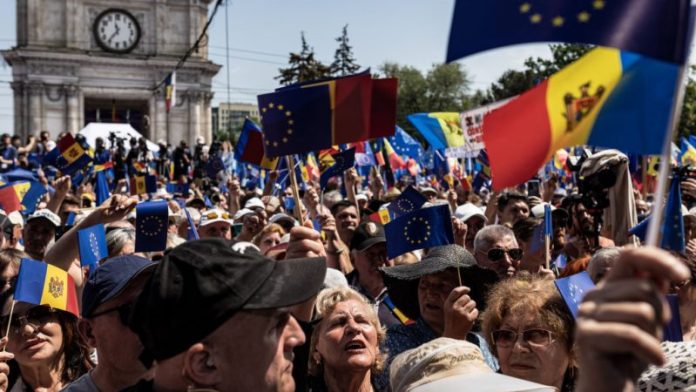Most polls show that Moldovans will support the pro-EU constitutional amendment to be adopted on Sunday, giving President Maia Sandu an advantage in the two-round presidential election, IntelliNews reports.
Sandu is projected to win both the referendum and the first round of the presidential election. However, key details not fully reflected in the diverging polls will prove important for future developments, especially in shaping the political landscape ahead of next year’s parliamentary elections.
If pro-EU forces win a definitive victory next year (i.e. win a majority in parliament), they are expected to capitalise on the strong support shown by European officials and push ahead with accession negotiations, which will officially begin in June 2024.
It is difficult to predict details such as the degree of support for the pro-EU constitutional amendment passed on October 20 and the combined results of Sandu’s main challengers, who appear to have a broader base than the incumbent. These factors will influence the actions of pro-Russian forces between the two rounds of the presidential election.
The presidential race is likely to move to a second round
Sandu is unlikely to win a majority of votes in the first round, and the second round could be tight under certain conditions.
There are four serious contenders in the race, with two enjoying notable support in the polls. Former chief prosecutor Alexandr Stoianoglo, fired by Sandu on controversial legal grounds, is running from the moderate pro-Russian Socialist Party, led by former president Igor Dodon. Independent politician Renato Usatii is also running, representing his own party, Our Party (Partidul Nostru). Usatii supported Sandu in the second round of the last presidential election. While Stoianoglo has expressed support for Moldova’s accession to the EU, Usatii has not yet taken a definite position.
Former communist politician Vasile Tarlev, who served as prime minister from 2001 to 2008, and former anti-corruption prosecutor Victoria Furtuna are closer to the Pobeda political bloc, which is backed by fugitive oligarch Ilan Shor, now in Moscow. Pobeda (which means “Victory”) is a visible tool Russia is using to interfere in Moldova’s electoral process. Shor’s chosen candidate was banned by the Moldovan authorities. Shor was sentenced to 15 years in prison for his involvement in a $1bn bank fraud that surfaced in 2015. He is also subject to international sanctions by Western countries.
According to some polls, the two candidates unofficially backed by Pobeda together have an electoral base of just over 10 per cent, comparable to Stoianoglo and Usatii.
A recent poll conducted by iData for IPN confirms Sandu’s lead with 29.5 per cent support, followed by Usatii with 13.3 per cent and Stoianoglo with 11.5 per cent. The two candidates supported by Victory, Tarlev and Furtuna, lag behind with 6.1 per cent and 5.5 per cent respectively.
Pro-EU constitutional referendum
The failure of Moldova’s pro-EU constitutional referendum on October 20 is highly unlikely, but if it fails, it would stall Moldova’s EU accession process for years.
A recent CBS Research poll conducted for the Watchdog community found 55% in favour of amendments in favour of the EU, 35% against, and about 10% undecided. The main problem remains turnout.
However, the Constitutional Court lowered the threshold, ruling that the referendum would be recognised as valid with a turnout above 30% as it did not affect key elements of the constitution. The court also confirmed that a simple majority vote was sufficient to pass the amendments.
According to representatives of the ruling Action and Solidarity Party (PAS), which has a solid majority and can hold a vote overnight if necessary, there is no need for a parliamentary vote on the amendments.
